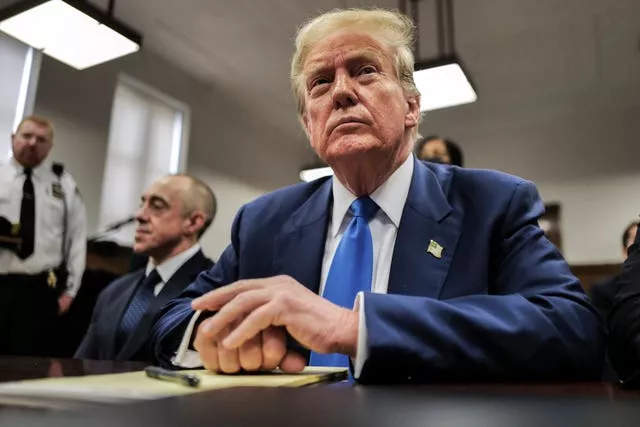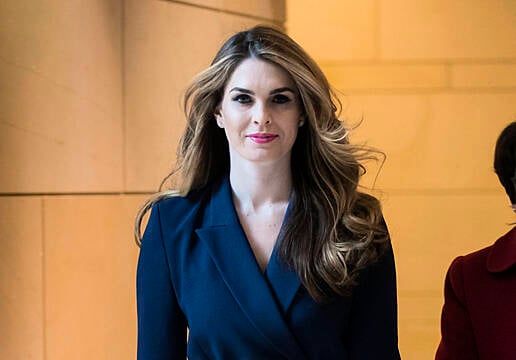Hope Hicks, a former long-time adviser to Donald Trump, took the witness stand on Friday in his criminal trial, where prosecutors are expected to question her about her knowledge of hush money payments made during the 2016 presidential campaign.
Ms Hicks, who served as White House communications director, is the first close Trump adviser to testify in the case, which accuses the Republican former president of a scheme to illegally influence the 2016 election by silencing women who claimed to have sexual encounters with him.
Ms Hicks, who is is testifying for the prosecution under a subpoena, acknowledged she was “really nervous” after stepping up to the microphone.
Referring to her former boss as “Mr Trump”, she told the court she last communicated with him in the summer or autumn of 2022.

While no longer in Trump’s inner circle, Ms Hicks spoke about the former president in glowing terms as the prosecutor began questioning her about her background.
Ms Hicks complimented Trump multiple times in the first few minutes of her testimony, describing him as a “very good multitasker, a very hard worker”.
Ms Hicks served as Trump’s 2016 campaign press secretary and was one of a small number of early campaign staffers who joined his administration.
Prosecutors say Ms Hicks spoke with Trump by phone during a frenzied effort to keep allegations of his marital infidelity out of the press after the infamous “Access Hollywood” tape leaked weeks before the 2016 election.

In the tape, from 2005, Trump boasted about grabbing women without their permission.
Trump has denied the allegations of extramarital sexual encounters.
The presumptive Republican presidential nominee for election this November denies any wrongdoing in the case.
Former Trump attorney and fixer, Michael Cohen, the prosecution’s star witness, has yet to take the stand in the hush money trial.
But jurors are already hearing Mr Cohen’s words as prosecutors work to directly tie Trump to payments to silence women with damaging claims about him before the 2016 election.
The second week of testimony in the case will wrap up on Friday, a day after jurors heard a potentially crucial piece of evidence: a recording of Trump and Mr Cohen, then his lawyer, discussing a plan to pay off an ex-Playboy model who claimed to have had an affair with Trump.
The former president denies the affair.
Prosecutors have spent the week using detailed testimony about meetings, email exchanges, business transactions and bank accounts to build on the foundation of their case accusing Trump of a scheme to illegally influence the election.
They are setting the stage for pivotal testimony from Mr Cohen, who paid porn actor Stormy Daniels 130,000 US dollars (£104,000) for her silence before he went to prison for the hush money scheme.
Trump’s defence has worked to poke holes in the credibility of prosecutors’ witnesses, and show that Trump was trying to protect his reputation and family – not his campaign – by keeping the women quiet.
The defence also suggested, while questioning a lawyer who represented two women in hush money negotiations, that Trump was, in fact, the victim of extortion.
The recording played on Thursday was secretly made by Mr Cohen shortly before the 2016 election.
Mr Cohen is heard telling Trump about a plan to purchase the rights to former Playboy model Karen McDougal’s story from the National Enquirer tabloid so that it would never come out.
The tabloid had previously bought Ms McDougal’s story to bury it on Trump’s behalf.
In the recording, Mr Cohen revealed that he had spoken to then-Trump Organisation chief financial officer, Allen Weisselberg, about “how to set the whole thing up with funding”.
Trump can be heard responding: “What do we got to pay for this? One-fifty?”
Trump suggested the payment be made with cash, prompting Mr Cohen to object by repeatedly saying “no”.
Trump then says “cheque” before the recording cuts off.
Prosecutors played the recording after calling to the stand Douglas Daus, a forensic analyst from the Manhattan district attorney’s office who performed analyses on iPhones that Mr Cohen turned over to authorities during the investigation.
Mr Daus will return to the stand on Friday morning, and it is not clear who will follow him.
Jurors also heard more than six hours of crucial testimony this week from Keith Davidson, a lawyer who represented Ms McDougal and Ms Daniels in their negotiations with Mr Cohen and the National Enquirer – the tabloid that bought and buried negative stories in an industry practice known as “catch and kill”.
Mr Davidson on Thursday described being shocked that his hidden-hand efforts might have contributed to Trump winning the 2016 election.
“What have we done?” Mr Davidson texted the then-editor of the National Enquirer on election night when it became clear that Trump was going to win. “Oh my god,” the tabloid editor responded.
“There was an understanding that our efforts may have in some way – strike that – our activities may have in some way assisted the presidential campaign of Donald Trump,” Mr Davidson told jurors.
Trump’s lawyers sought earlier in the day to blunt the potential harm of Mr Davidson’s testimony by getting him to acknowledge that he never had any interactions with Trump – only Mr Cohen.
In fact, Mr Davidson said, he had never been in the same room as Trump until his testimony.
“I had no personal interactions with Donald Trump. It either came from my clients, Mr Cohen or some other source, but certainly not him,” Mr Davidson said.
Trump is charged with 34 counts of falsifying internal Trump Organisation business records.
The charges stem from things like invoices and cheques that were deemed legal expenses in Trump Organisation records when prosecutors say they were really reimbursements to Mr Cohen for the hush money payment to Ms Daniels.







